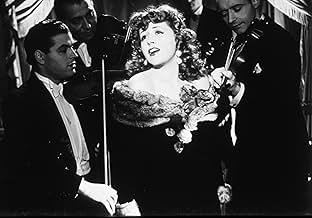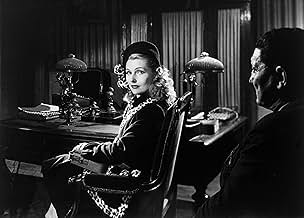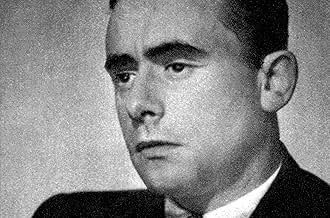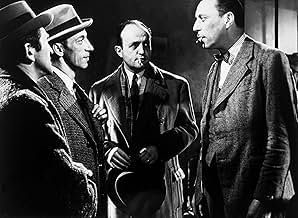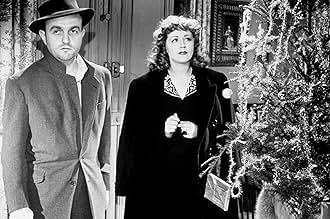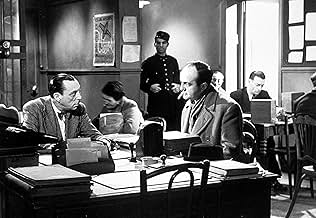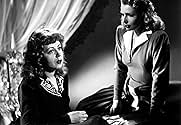IMDb RATING
7.7/10
6.6K
YOUR RATING
A jealous husband intends to kill the man his wife is meeting for business, but arrives to find the deed already done.A jealous husband intends to kill the man his wife is meeting for business, but arrives to find the deed already done.A jealous husband intends to kill the man his wife is meeting for business, but arrives to find the deed already done.
- Awards
- 2 wins & 1 nomination
Henri Arius
- Léopardi
- (as Arius)
Charles Blavette
- Le gendarme Poitevin
- (as Blavette)
René Blancard
- Le commissaire principal de la P.J.
- (as R. Blancard)
Robert Dalban
- Paulo
- (as R. Dalban)
Jean Daurand
- L'inspecteur Picard
- (as J. Daurand)
Jean Dunot
- Nitram
- (as J. Dunot)
Jacques Grétillat
- Auguste
- (as J. Grétillat)
Gilberte Géniat
- Mme Beauvoir
- (as G. Géniat)
Gabriel Gobin
- Le patron du bistrot
- (as G. Gobin)
François Joux
- L' officier de police Fayard
- (as F. Joux)
Storyline
Did you know
- TriviaHenri-Georges Clouzot wrote almost two-thirds of the film only having read the novel years before, recalling it from memory, since it was out of print by the time he started the screenplay. When the novelist Stanislas-André Steeman saw the film, he was furious about the differences between the novel and the film.
- GoofsWhen Antoine is repeating Maurice's deposition to the typist, he says that the confrontation between Maurice and Brignon at the restaurant took place on Wednesday, December 2, 1946. In 1946, December 2 fell on a Monday.
- Quotes
L'inspecteur adjoint Antoine: I have to admit, I've taken a liking to you, Miss Dora Monier.
Dora Monier: Me?
L'inspecteur adjoint Antoine: Because I have to say, you're just my type. When it comes to women, we'll never have a chance.
- ConnectionsEdited into Histoire(s) du cinéma: La monnaie de l'absolu (1999)
Featured review
"Quai des Orfevres", directed by the brilliant Henri-Georges Clouzot, is a film to treasure because it is one of the best exponents of French film making of the postwar years. M. Clouzot, adapting the Steeman's novel, "Longtime Defence", shows his genius in the way he sets the story and in the way he interconnects all the characters in this deeply satisfying movie that, as DBDumonteil has pointed out in this forum, it demonstrates how influential Cluzot was and how much the next generation of French movie makers are indebted to the master, especially Claude Chabrol.
The crisp black and white cinematography by Armand Thirard has been magnificently transferred to the Criterion DVD we recently watched. Working with Clouzot, Thirard makes the most of the dark tones and the shadows in most of the key scenes. The music by Francis Lopez, a man who created light music and operettas in France, works well in the context of the film, since the action takes place in the world of the music halls and night clubs.
Louis Jouvet, who is seen as a police detective, is perfect in the part. This was one of his best screen appearances for an actor who was a pillar of the French theater. Jouvet clearly understood well the mechanics for the creation of his police inspector who is wiser and can look deeply into the souls of his suspects and ultimately steals the show from the others. In an unfair comment by someone in this page, Jouvet's inspector is compared with Peter Falk's Columbo, the television detective. Frankly, and no disrespect to Mr. Falk intended, it's like comparing a great champagne to a good house wine.
Bernard Blier is perfect as the jealous husband. Blier had the kind of face that one could associate with the man consumed with the passion his wife Jenny Lamour has awakened in him. Martineau is vulnerable and doesn't act rationally; he is an easy suspect because he has done everything wrong as he finds in the middle of a crime he didn't commit, but all the evidence points to the contrary.
The other great character in the film is Dora, the photographer. It's clear by the way she interacts with Jenny where her real interest lies. Simone Renant is tragically appealing as this troubled woman and makes an enormous contribution to the film. Suzy Delair, playing Jenny, is appealing as the singer who suddenly leaps from obscurity to celebrity and attracts the kind of men like Brignon, the old lecher.
The film is one of the best Clouzot directed during his distinguished career and one that will live forever because the way he brought all the elements together.
The crisp black and white cinematography by Armand Thirard has been magnificently transferred to the Criterion DVD we recently watched. Working with Clouzot, Thirard makes the most of the dark tones and the shadows in most of the key scenes. The music by Francis Lopez, a man who created light music and operettas in France, works well in the context of the film, since the action takes place in the world of the music halls and night clubs.
Louis Jouvet, who is seen as a police detective, is perfect in the part. This was one of his best screen appearances for an actor who was a pillar of the French theater. Jouvet clearly understood well the mechanics for the creation of his police inspector who is wiser and can look deeply into the souls of his suspects and ultimately steals the show from the others. In an unfair comment by someone in this page, Jouvet's inspector is compared with Peter Falk's Columbo, the television detective. Frankly, and no disrespect to Mr. Falk intended, it's like comparing a great champagne to a good house wine.
Bernard Blier is perfect as the jealous husband. Blier had the kind of face that one could associate with the man consumed with the passion his wife Jenny Lamour has awakened in him. Martineau is vulnerable and doesn't act rationally; he is an easy suspect because he has done everything wrong as he finds in the middle of a crime he didn't commit, but all the evidence points to the contrary.
The other great character in the film is Dora, the photographer. It's clear by the way she interacts with Jenny where her real interest lies. Simone Renant is tragically appealing as this troubled woman and makes an enormous contribution to the film. Suzy Delair, playing Jenny, is appealing as the singer who suddenly leaps from obscurity to celebrity and attracts the kind of men like Brignon, the old lecher.
The film is one of the best Clouzot directed during his distinguished career and one that will live forever because the way he brought all the elements together.
Details
- Release date
- Country of origin
- Official site
- Language
- Also known as
- Quay of the Goldsmiths
- Filming locations
- Paris, France(Exterior)
- Production company
- See more company credits at IMDbPro
Box office
- Gross US & Canada
- $180,974
- Opening weekend US & Canada
- $9,632
- Oct 27, 2002
- Gross worldwide
- $180,974
- Runtime1 hour 46 minutes
- Color
- Aspect ratio
- 1.37 : 1
Contribute to this page
Suggest an edit or add missing content


![Watch Bande-annonce [OV]](https://m.media-amazon.com/images/M/MV5BMmI1MGQ3ZWItMWI3Yi00M2RhLTkwMzEtODUyZWE5NmVhZGRlXkEyXkFqcGdeQXRyYW5zY29kZS13b3JrZmxvdw@@._V1_QL75_UX500_CR0)
